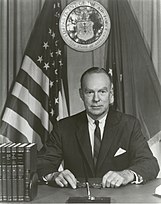
In letters dated 9 and 10 April 1956 to Chairman Rothschild, Cooper encouraged the ACC to reject the position of its own Legal Division.[1] Given Eisenhower’s July 1955 statement that the United States would include a satellite as part of its IGY effort, Cooper argued that the US had precipitated the need to resolve the issue of sovereignty by announcing its intention to launch a satellite into outer space. Cooper felt that if the US was prepared to launch such a satellite, it ought also to be prepared to state its position on the sovereignty issue. In a second letter, Cooper reiterated his earlier position. He reasoned that the United States, by announcing its intention to launch a satellite, had accepted the proposition that it did not retain sovereignty of the outer space above its territory and thereby waived any legitimate grounds on which to object to foreign satellites passing over its territory. Cooper’s argument was clearly in accord with President Eisenhower’s position of espousing a freedom of passage in outer space, but the president’s position and its implications had apparently not yet been communicated outside a small circle of advisors. Given Professor Cooper’s efforts, ACC Chairman Rothschild quickly responded to Secretary Sharp’s request. Rothschild reiterated the positions taken by Kinsey and the Legal Division and welcomed Air Force and other DOD input when the studies Sharp had initiated were completed.[2]
